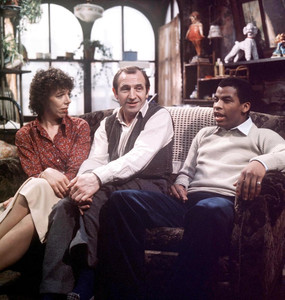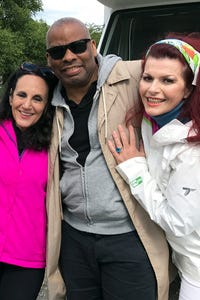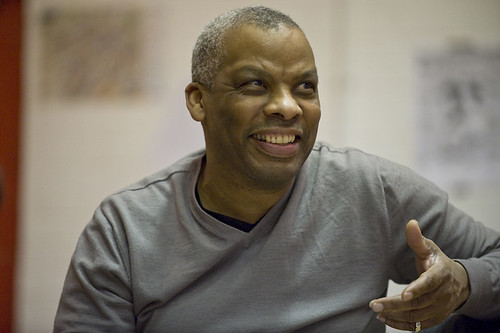February 28th: Today’s Feature
- webbworks333
- Feb 28, 2025
- 6 min read
February
Don Warrington MBE (born Donald Williams, 23 May 1951) is a Trinidadian-born British actor. He is best known for playing Philip Smith in the ITV sitcom Rising Damp (1974–78), and Commissioner Selwyn Patterson in the BBC detective series Death in Paradise (2011–present).
He was appointed Member of the Order of the British Empire (MBE) in the 2008 Birthday Honours.

Early lifeWarrington was born in Trinidad, but moved to England with his mother and brother at a young age, while his sister stayed in Trinidad. He was brought up in Newcastle upon Tyne. His father, Basil Kydd, was a Trinidadian politician who died in 1958. Warrington attended Harris College (now the University of Central Lancashire) and trained as an actor at the Drama Centre London. As there was already an actor called Don Williams when he joined Equity, he took the stage surname "Warrington" after Warrington Road, the street he grew up on. He started acting in repertory theatre at the age of 17.
Television and Film
Warrington is best known for playing Philip Smith in Rising Damp, from 1974 to 1978, alongside Leonard Rossiter, Richard Beckinsale, and Frances de la Tour. Warrington also appeared as series regular in the crime drama C.A.T.S. Eyes, as government contact Nigel Beaumont (1985–1987); as General Harris in Impact Earth (2007), and as Judge Ken Winyard in New Street Law.
He regularly provides voice-overs for both BBC television and radio.
His film roles included the movie version of Rising Damp (1980), the Kenny Everett horror comedy Bloodbath at the House of Death (1983), The Lion of Africa (1987), Kenneth Branagh's Hamlet (1996), [Peter Greenaway's 81⁄2 Women (1999), and the horror film Lighthouse (1999).
Theatre
Warrington is also a theatre actor and has performed with the National Theatre, the Royal Shakespeare Company, Bristol Old Vic and the Royal Exchange, Manchester.
*************************
In His Words
“Being uprooted from Trinidad to Newcastle as a young child is an extraordinary experience to have. In some ways you spend the rest of your life coming to terms with the shock of it. But the upside is that at a very young age one is still very flexible, which helps you to adjust to arriving somewhere you thought you knew about but didn’t, because you discover the information you were given is wrong. It is propaganda. We were told about somewhere that seemed utterly glorious. The reality was terrible.
“I was shocked at how dull England was. Coming from such a vivid, tropical island, it was rather a dank, damp and dark place. It was scary, your whole system is shocked physically and emotionally. And you become aware that you are different to everybody else. When I was first taken to Newcastle, there was nobody apart from my immediate family who looked like me or sounded like me.
“As a child you just want to fit in. You assimilate as fast as you can. I had to make this new environment mine. It is survival. At school, everything – everything – is against you, so you have to be as flexible as you can. And that means there are things you give up which, later in life, you rather regret. You forget where you are from.
Do I have any romantic advice for my younger self? I would say you don’t need to be as greedy as you are being. You have more time than you think. At that age you are not in control. Desire is the beast you are trying to handle. My kids seem to make relationships work better – and I think that is because men and women are much closer now. My children had girls who were friends. When I was 16, girls weren’t your friends, they were something one wanted to conquer.
I didn’t go back to Trinidad for a long while because I felt one has to go forward. So there were bits one left unattended. But eventually I did go back and I felt the release, the sense of really being able to breathe in and out properly. Until you experience it, you don’t realise the tension that one lives with. It is so nice to experience something that is in your bones. The physicality of being there, the recognition one sees in the people – they do things you do instinctively – that gives you a feeling of ease.
The recent treatment of Windrush-era immigrants doesn’t surprise me. People are very careless about that kind of thing. People don’t realise the history. They are not taught about the contribution these people made or the enthusiasm with which they came. Those people to my mind are heroic. They put up with so much but maintained an affection for this country – and to this day you can still see that in them. And you have a government that is so interested in plugging into what appears to be the popular appeal.
The fact is that those people were never considered – they became invisible because their contribution was never acknowledged in the first place. The Windrush generation came, in the main, as adults who had grown up in the Caribbean. There is a difference between that and children who were brought here by their parents. I was one of them. One of the things that is frightening as a child is you see that the people you took to be confident and understand the world actually don’t – because they have come to somewhere strange too. That is scary for a child because the adults become children within the new environment.
My career would blow my younger self’s mind because at that age, it was all just a vast dream. All I knew was that I needed to
go to drama school and that would be my pathway. So my life is a series of shocks. Coming to drama school in London was another shock. There were people who had access to the theatre and they appeared to be so knowledgeable and move with such ease in that world. I was like a rabbit in the headlights.
Rising Damp was never something I thought I would do because when I was at drama school, we were very, very serious. Then along came this amazing comedy. I didn’t think I was funny, so it was surprising to find I could make people laugh. I look back with fondness, but one forgets those moments of terror and fear. Rising Damp was a huge learning curve. I was flying blind, which is basically how I live my life. One lives with this fear of being found out. But that is why my advice to my younger self would be to be brave.
I thought it was a joke when I was asked to do King Lear. Even after all these years I never thought it was possible. There is a trajectory to these things if you grow up in classical theatre. You play all these Shakespeare roles then maybe the pinnacle is Lear. But my career has been more, “Whoops, there we go, here is another surprise!” I stumble upon things really. So I have just done Death of a Salesman in Manchester, which was never something I thought I would get a chance to do.
1967 – The year Don turns 16
Milton Keynes is founded as a new town
Elvis Presley marries Priscilla Beaulieu
Celtic become the first British team to win the European Cup
I don’t know why Death in Paradise works but it is a phenomenon. People seem to love it. What keeps me going back is trying to find new facets to make the character [Selwyn Patterson] interesting over many years. And also, Guadeloupe is very beautiful! It is a very nice place to spend the summer. It is in the Caribbean, so in a way I am going home.
As long as we are asking questions about diversity, it is a sign of the problem. When we take it as read that you turn on your television and see someone whose skin is black and are not puzzled, you just think it is a reflection of the way we live, then we will be there. But that is not where we are. There is always still comment – and as long as that goes on, it shows the journey we have to yet make.
Like a lot of my generation, I thought we could change the world. It seemed very conventional and stifling and I wanted to break out and live with freedom. There was a great drive to change the world so people could be free to express themselves. Think how that would affect the way we treat other people – they would stop being ‘other’, people would stop being ‘dangerous’, all that sense of wanting to close down and retreat would not be happening if people had a positive view of otherness.
And I still think fundamentally that love is all you need.





























